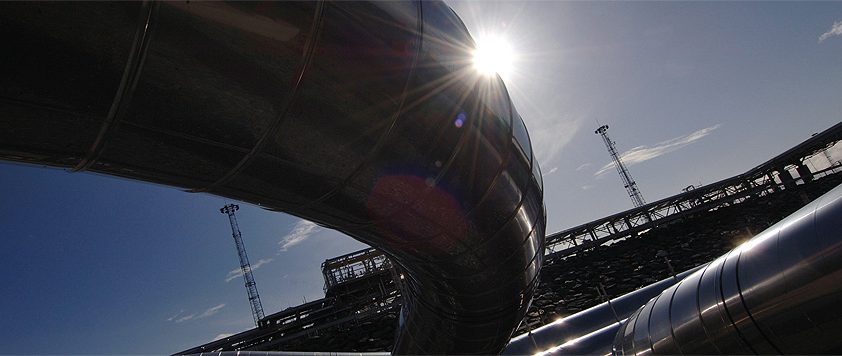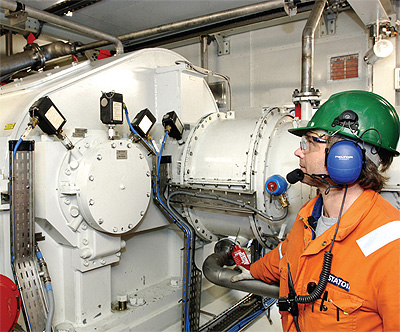
ABB’s Innovative Power & Automation Solutions for Oil & Gas
Energy & automation experts
As one of the world’s leading engineering companies, ABB helps its customers to use electrical power effectively and to increase industrial productivity in a sustainable way.
Technology plays a key role for ABB and it has nine research centres, 6000 scientists and 70 university collaborations across the world, all working together to develop unique technologies that enable its customers to be more competitive. Manager of ABB’s Oil, Gas and Petrochemicals business in Norway, Bjarte Pedersen, outlines the organisation’s areas of expertise: “We’re an automation and electrical company with global reach, that provide products, systems and services within our two core areas, power and automation technologies.”
ABB provides process automation and electrical systems to industrial customers within oil and gas, petrochemicals, marine, pulp and paper, metals and mineral. A broad portfolio of power products and systems provide reliable power supply solutions to power transmission and distribution grids and power plants. ABB is also a leading supplier of industrial robots for handling, welding and paint applications.
Speaking specifically about his role, Bjarte says: “I work in the process automation division as part of the overall, worldwide Oil, Gas, and Petrochemicals business unit. We have offices in more than 35 countries and more than 10,000 employees globally. We deliver electrical and automation systems and provide services throughout the lifecycle of the product. Our main customers are oil, gas and petrochemical companies worldwide.”
ABB customer’s benefit from the investment the company makes in developing innovative solutions to assimilate electrical equipment and automation systems.
“R&D is an area that we spend a lot of time and money on,” reveals Bjarte. “Although ABB is an automation and electrical systems supplier, we’re improving the solutions related to the interface between these two areas because the main reason for production loss at our customers’ facilities is mechanical equipment failure, particularly rotating equipment such as compressors and pumps that are driven by an electrical drive system. We’re focusing on providing better integration between electrical equipment and automation systems so we can retrieve enough information from the electrical system to support customers in moving on from periodic maintenance.”
Explaining further, he says: “Customers don’t currently have enough information to indicate whether maintenance is required so we’re retrieving information to support conditionbased  maintenance, which is a huge step forward. They are able to reduce their maintenance interval, which saves money and reduces stoppage time for repairs.”
maintenance, which is a huge step forward. They are able to reduce their maintenance interval, which saves money and reduces stoppage time for repairs.”
Keeping a firm focus on technological developments helps ABB to retain credibility as an expert in its field. “The development of new technology and solutions is important,” comments Bjarte. “For example, a customer may have FPSOs operating at different sites – in Norway, Australia, Brazil and Africa perhaps. For cases like this, we have developed a FPSO remote operation centre and from that we can connect to each of those FPSOs dotted around the world to provide remote support. As I already described, we can support the customers in evaluating when rotating machinery needs to be maintained or early maintenance information from the electrical systems, and an important part of this is developing IT security solutions that can remotely connect to those installations – we have made the effort to develop secure IT solutions for remote connections to FPSOs and offshore platforms, certified to meet various oil companies standards. This allows a switch from break-and-fix, and preventive maintenance to more predictive maintenance, which means ideally that you only maintain equipment when it is needed, and before it malfunctions. Further on, it also provides immediate access to our system specialists if site support is needed for troubleshooting.
Remote connection is also an important aspect of ABB’s revolutionary Service Environment program, where ABB takes full responsibility for operation, service and support of safety and automation systems at installations onshore and offshore. The Service Environment program meets the industry’s stringest demands in terms of information security, enabling service and maintenance work to be conducted from remote service rooms. Remote work based on easier access to systems and information from land, contributes to more efficient process management, reduced response time and lower costs. Modern operations rely on advanced technological solutions to optimise production, reduce operating costs, increase safety and extend the overall field lifecycle. The unique Service Environment program is designed to help customers effectively manage these complex and integrated systems. For operators, the benefits gained from the ABB Service Environment are significant.
Another example of an R&D project currently ongoing is the TAIL Integrated Operations (IO) project, which is a research and development collaboration consortium led by StatoilHydro and ABB, which also includes IBM, Aker Solutions and SKF. Together, the consortium is developing technology, processes and knowledge to extend the life of StatoilHydro’s North Sea oil and gas fields. The task is to develop technologies and work processes to increase daily oil and gas production by up to five per cent, reduce maintenance costs by 30 per cent, and significantly improve health, safety and environmental performance.
The consortium and StatoilHydro are each contributing equally to the project in terms of input and resources. In addition, the Norwegian Research Council is a major contributor to the funding of the project, which has a budget of approx. $40 million and will run for a period of three and a half years ending in Q2 2009. One main focus for ABB in this project is condition monitoring of electrical equipment.
Another example of an ongoing R&D project is development of a low cost wireless vibration sensor intended for condition monitoring of electrical motors, which also recently received the OTC Spotlight on New Technology prize.
“We’re also driving the market in another area that is new to the oil and gas industry,” he says. “Traditionally offshore platforms have been powered by gas turbines located on the platform, which generally means high maintenance and lower regularity of the offshore installation. Due to weight and space limitations, those turbines are generating power with an efficiency of less than 35 per cent. If we’re able to generate more power onshore where there are no weight and space limitations then we can have a combined cycle gas turbine, which means efficiency can increase to well over 50 per cent, resulting in reduced consumed fuel gas and reduced emissions by 30-70 per cent. Also this scheme allows low manning operations offshore. ABB is providing solutions and delivering the technology to power the offshore platforms with electricity from onshore.”
Besides its obvious technical strength, the organisation can look forward to a positive future due to the current booming oil industry. Bjarte thinks the coming years will reveal numerous opportunities: “The price of oil is very high and all forecasts indicate it will remain this way. The Norwegian continental shelf has been developed so there are less greenfield opportunities remaining there but in the Gulf of Mexico, Western Africa, Russia and the Middle East there is huge potential for growth.
“And at the same time we will see that there still is a need for the transportation of energy, particularly in India, Russia and China. ABB’s power and automation solutions gives us a strong position as a supplier to companies involved in exploration and production of oil and gas, as well as transportation of energy. With our long experience and proven technology I’m sure ABB will have good prospects in the oil and gas business,” he concludes.
ABB AS
Products: Power and automation technologies